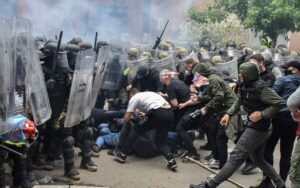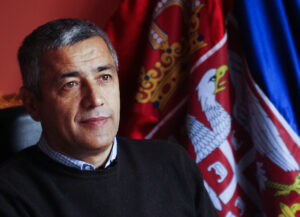In a charged courtroom in Pristina, Kosovo’s Special Prosecutor Naim Abazi stood before a throng of journalists on a crisp Wednesday morning, delivering a statement that would send ripples across the Balkans. Forty-five individuals, including Milan Radoicic, a figure shrouded in controversy, were formally charged for their roles in the armed attack in Banjskë, a small village in northern Kosovo that has become a flashpoint in the fraught relationship between Serbia and Kosovo. The charges ranged from organising and directing terrorist activities to financing and money laundering, painting a picture of a criminal network with deep roots and dangerous ambitions.
Radoicic, a man as polarising as the region’s history, is not just any accused; he’s a name that resonates deeply within both Kosovo and Serbia. While in Kosovo, he’s notorious for his alleged involvement in organised crime and violence, in Serbia, he is hailed by some as a defender of Serbian interests. The contrast in his perception is emblematic of the broader regional divide—a divide that continues to fuel unrest, 25 years after the Kosovo War.

A Day of Violence in Banjskë
The events that led to this latest round of indictments unfolded on September 24th of last year, when an armed Serbian group attacked Kosovar police in Banjskë, resulting in the tragic death of Sergeant Afrim Bunjaku and the killing of three Serbian assailants. The attack was a stark reminder that the embers of conflict between Kosovo and Serbia still smoulder, threatening to ignite at any moment.
For Abazi, the significance of this case extends beyond the courtroom. “The defendants played various roles within their criminal group, from organising and directing terrorist activities to financing and money laundering,” he stated, underscoring the sophisticated and far-reaching nature of the operation. At the heart of it all is Radoicic, a key figure whose alleged coordination and criminal activities have cast a long shadow over the region.
Yet, conspicuously absent from the prosecutor’s remarks was any mention of Serbia’s potential involvement in the attack—a point that Kosovo authorities have consistently raised, only to be flatly denied by Belgrade. The omission speaks volumes about the delicate political balancing act that continues to define the region’s troubled relationship.
Who is Milan Radoicic?
Radoicic’s name has long been synonymous with controversy. A former deputy leader of the Serbian List, the largest Serbian political party in Kosovo backed by Belgrade, he resigned from his post just days after the Banjskë attack. For years, Radoicic has been under the scrutiny of the U.S. and the U.K., both of which have sanctioned him for his involvement in international organised crime. The U.S. State Department has branded him a criminal who must be held accountable — a sentiment echoed by many in Kosovo.
Born and raised in Kosovo, Radoicic first emerged on the public radar in 2011 alongside Zvonko Veselinovic, a business associate with ties to a Kosovan media mogul. Both Radoicic and Veselinovic, were accused of malfeasance in Serbia — a charge that would foreshadow a litany of allegations against them. In Kosovo, his name became infamous in 2017 when then-Prime Minister Ramush Haradinaj pointed to him as the man pulling the strings in northern Kosovo. Haradinaj’s assertion, made on a live television program, painted Radoicic as the ultimate power broker in the region, and invited him to his office — a move that raised eyebrows and underscored the murky ties between politics and crime in the Balkans.

Radoicic’s connections reach the highest echelons of power in Serbia, where he is seen in public with ministers, senior officials, and even President Aleksandar Vucic. In contrast, in Kosovo, he is a wanted man, accused of witness intimidation in the high-profile Brezovica investigation, and repeatedly named as the prime suspect in the assassination of Oliver Ivanovic, a prominent Kosovo Serb politician. The arrest warrant issued by Kosovo has done little to deter him; he continues to move freely in Serbia, bolstered by his high-level connections and a judicial system that has so far refused to extradite him.
The Broader Implications
The indictments in Pristina are just the latest chapter in a saga that is as much about geopolitics as it is about crime. Radoicic’s actions are not merely the deeds of a rogue actor but are reflective of the broader, unresolved tensions between Serbia and Kosovo. The 1998-1999 Kosovo War, which left over 10,000 dead—mostly ethnic Albanians—still looms large. NATO’s intervention, aimed at preventing a genocide akin to Srebrenica, brought an end to the violence but not to the hostilities. These historical wounds continue to hinder both Serbia’s and Kosovo’s paths towards European Union membership, trapping the region in a cycle of mistrust and animosity.
Serbia, under the leadership of Aleksandar Vucic — a former official from the Milosevic era who defended the regime’s brutal actions during the Balkan wars — has increasingly aligned itself with Kremlin interests, complicating its relationship with the West. Meanwhile, Kosovo, striving to solidify its sovereignty and international standing, finds itself at odds with a neighbour that refuses to recognise its independence and continues to exert influence over the Serbian minority in Kosovo.
The international community, too, has a role to play in this complex dynamic. For years, the West has walked a fine line, attempting to engage Serbia as a strategic partner while simultaneously condemning actions that undermine Kosovo’s sovereignty. The stakes are high; Serbia’s lithium reserves are of immense value to Western economies, particularly as the world pivots towards electric vehicles and green technology. This economic leverage has allowed Serbia to skirt full accountability, even as it cosies up to Moscow — a relationship that many in the West view with increasing unease.
The Search for Justice
As for Radoicic, his fate remains uncertain. Despite an international arrest warrant issued by INTERPOL at the request of Kosovo’s Interior Ministry, he remains a free man in Serbia, shielded by a government that has consistently rebuffed efforts to bring him to justice. The High Court in Belgrade rejected a request from the Public Prosecutor’s Office for his detention, seizing his passport but stopping short of taking any further action.
Kosovo’s Prime Minister, Albin Kurti, has made it clear that the continuation of dialogue with Serbia on normalising relations is contingent upon the extradition of Radoicic and his paramilitary group. “As long as Radoicic and his group remain free and protected in Serbia, there can be no trust in the dialogue for normalisation,” Kurti stated on June 28th, reflecting the deep-seated distrust that has come to define negotiations between the two nations.
The international community has repeatedly called for accountability, urging that those responsible for the attack in Banjskë be brought to justice. Yet, as with so many aspects of the Kosovo-Serbia conflict, achieving this remains an uphill battle, complicated by historical grievances, regional politics, and the lingering spectre of the past.
A Balkan Tragedy Revisited
The Banjskë indictments serve as a stark reminder of the unfinished business that continues to haunt the Balkans. For Kosovo, pursuing justice for the attack is not just about punishing those responsible; it’s about asserting its sovereignty and sending a message that the era of impunity is over. For Serbia, the case of Milan Radoicic is emblematic of a larger struggle over influence, identity, and the legacy of a conflict that refuses to be consigned to history.
As the world watches, the fates of these 45 accused individuals, and particularly that of Milan Radoicic, could very well shape the next chapter of this long-running saga. It is a chapter fraught with tension, one that underscores the fragility of peace in a region still grappling with the ghosts of its past. For Kosovo and Serbia, the path forward is uncertain, but what remains clear is that the shadow of the past continues to loom large, shaping the present and, inevitably, the future.
As we head into the weekend, it’s worth reflecting on the broader implications of this case. It’s not just a courtroom drama; it’s a microcosm of the unresolved tensions that define the Balkans. The road to peace is paved with the hard work of accountability and the courage to confront the past—a journey that Kosovo, Serbia, and the entire region must continue to navigate, one complex step at a time.
Vudi Xhymshiti, founder and chief editor of The Frontliner Magazine, brings a wealth of experience in reporting on global armed conflicts and political issues. With a background in Documentary Photography and Photojournalism from the University of the Arts London, and studies in Political Science, International Relations, and Diplomacy, Vudi skilfully merges human rights insights with dedicated journalism. His ethical and thoughtful reporting has graced top publications like The Guardian and The New York Times. At The Frontliner, launched in 2023, he explores the profound effects of conflicts on law, human rights, and freedoms, continuing his commitment to impactful storytelling.


